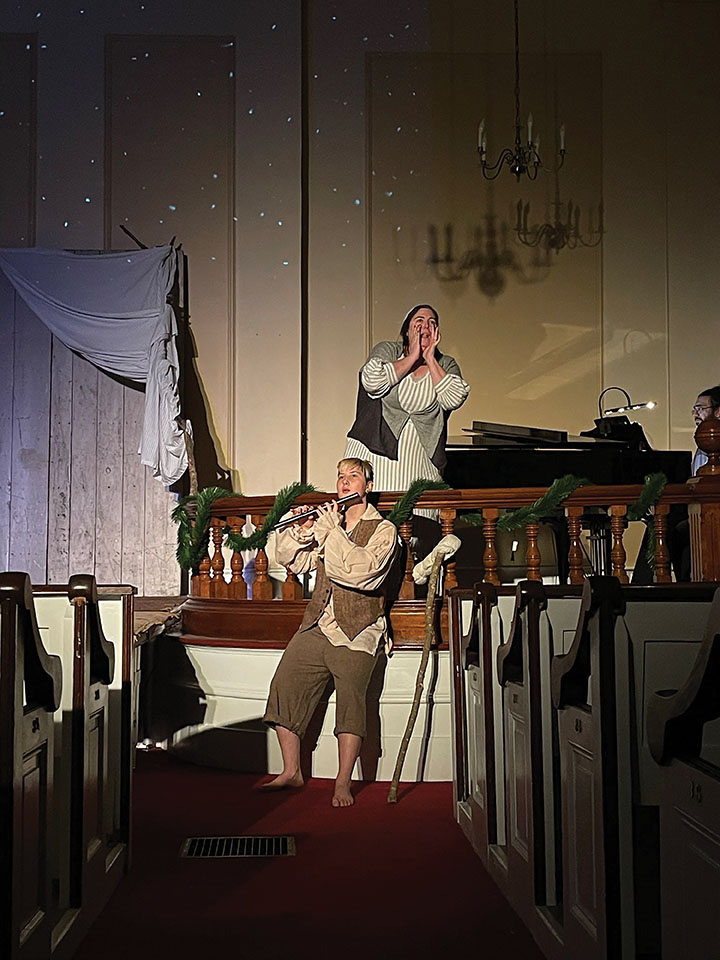
Courtesy of Barn Opera
A performance of “Amahl and the Night Visitors.”
By Julia Purdy
Sometimes inspiration strikes in a flash and a story almost writes itself. That seems to be the case with composer and librettist Gian Carlo Menotti’s “Amahl and the Night Visitors,” commissioned by NBC and premiering in 1951 with the NBC Opera Theatre in the debut of the “Hallmark Hall of Fame,” the longest-running prime-time series in the history of television, according to wikipedia.
“Amahl” has garnered a devoted following since its early years, especially since its first telecast in color in 1953. In those early days of television, my parents were strict about what we could and could not watch. But we made a point of watching, as a family, “Amahl and the Night Visitors,” through its changes of orchestra and performers. We knew the plot, the songs, the characters, by heart and we looked forward to each new performance’s variations in staging and interpretation. But the Barn Arts production is from being an “old chestnut.”
Now “Amahl and the Night Visitors” is back, thanks to Glenn Andres at the Salisbury UCC Church, who originally pitched the opera to Barn Opera four years ago, Collier told me. What Artistic Director Josh Collier aims to do is refresh the message of “Amahl” within the watching experience. The staging, costuming and visual details follow traditional forms, with an inspiring, interactive conclusion that Collier hopes will leave a lasting impression.
The story of three kings, magi or wise men, bearing gifts of gold, frankincense, and myrrh for the newborn Messiah and guided by a star, is a staple of the Christmas season, told in the Gospel of Matthew and retold in carols and in art as “The Adoration of the Magi.” As magi, they represent the yielding of pagan traditions to the Christian God; as kings, they represent rulers and inequality of power; as individuals, they represent the three dominant races: Caucasian, African and Asian.
In an interview, Gian Carlo Menotti recalled the personal inspiration that sparked this magnificent and moving opera:
“This is an opera for children because it tries to recapture my own childhood. You see, when I was a child I lived in Italy, and in Italy we have no Santa Claus. … Our gifts were brought to us by the Three Kings, instead.”
And, just as children still do, “…it didn’t matter how hard my little brother and I tried to keep awake at night to catch a glimpse of the Three Royal Visitors, we would always fall asleep just before they arrived. But I do remember hearing them. I remember the weird cadence of their song in the dark distance; I remember the brittle sound of the camels’ hooves crushing the frozen snow; and I remember the mysterious tinkling of their silver bridles.”
The three kings are Melchior, Kaspar, and Balthasar. “My favorite king was King Melchior, because he was the oldest and had a long white beard. My brother’s favorite was King Kaspar. He insisted that this king was a little crazy and quite deaf. … To these Three Kings I mainly owe the happy Christmas seasons of my childhood and I should have remained very grateful to them. Instead, I came to America and soon forgot all about them, for here at Christmas time one sees so many Santa Clauses scattered all over town. Then there is the big Christmas tree in Rockefeller Plaza, the elaborate toy windows on Fifth Avenue, the one-hundred-voice choir in Grand Central Station, the innumerable Christmas carols on radio and television—and all these things made me forget the three dear old Kings of my old childhood.
“But in 1951 I found myself in serious difficulty. I had been commissioned by the National Broadcasting Company to write an opera for television, with Christmas as deadline, and I simply didn’t have one idea in my head.”
Wandering through the Metropolitan Museum one day, he paused at a scene, “The Adoration of the Magi” painted three centuries before, and “suddenly I heard again, coming from the distant blue hills, the weird song of the Three Kings. I then realized they had come back to me and had brought me a gift.”
That gift became the lyric opera, “Amahl and the Night Visitors.”
If any creative work can be said to equal in power, message and presentation Charles Dickens’ “A Christmas Carol,” or Handel’s oratorio “Messiah,” it would be this little opera.
When the company created the first production in 2019, it was the first time it had been done locally in years, performed by the in-house artistic family of Barn Opera. “It was wildly successful, people loved it!” Collier said. The annual tradition grew from that first energizing success.
Collier said the opera is “a meditation on generosity and compassion. This opera is the secular sermon that we need right now in understanding that we can bridge the gap between ourselves and people that don’t look like us, act like us, live like us, or love like us, we can make the connection between the story that is told and the miracle of that compassion.”
In addition to the annual two performances (5:30 & 7:30 p.m.) at Salisbury Congregational Church on Dec. 21, Williston Congregational Church will be welcoming “Amahl”into its sanctuary for one day of performances as well, Dec. 22, 5:30 and 7:30 p.m. Information and tickets are available now at: barnopera.com/amahl-and-the-night-visitors.




